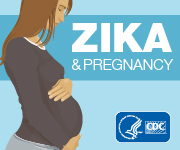Public health officials from the Centers for Disease Control and Prevention have concluded that Zika virus during pregnancy can cause microcephaly and other severe fetal brain defects. They also have linked the virus to other defects seen in infants including impaired growth, hearing loss, visual disorders, and eye malformation. Researchers continue to study the effects of Zika virus infection on pregnant women and their children, and this article will give you the state of understanding and recommendations as of April 15, 2016. For up to date information, please see the CDC website.
We know that a pregnant woman can be infected with the Zika virus and that she can pass the Zika virus to her fetus. Pregnant women primarily get the Zika virus through the bite of an infected mosquito, but they can also acquire the virus by having sex with an infected man or by transfusions of infected blood.
Due to the potentially severe effects of Zika virus infection on the developing fetus, the recommendation today is to protect pregnant (or women who may become pregnant) women from Zika virus infection. With that said, here is what we do not know yet: how likely a pregnant woman is to contract a Zika infection if exposed to the virus; and, if a pregnant woman does become infected we don’t know how likely the virus is to pass to her fetus, whether her fetus will develop birth defects, or when in the course of her pregnancy the virus might cause harm to the fetus. However, we do know that Zika virus may cause severe birth defects so avoidance of Zika infection is the first line of defense.
Finally, the evidence we have suggests that if a woman who is not pregnant contracts Zika virus infection, her future pregnancies will not be at risk for birth defects after the virus has completely cleared from her blood. The CDC suggests this should be expected by eight weeks after known infection or exposure risk, but, until we understand Zika more fully, I am advising my patients to avoid pregnancy for at least 12 weeks after any potential exposure—this means any woman who has traveled to a country with known Zika virus cases should use measures to prevent pregnancy for 12 weeks. I think the evidence suggests too great a risk otherwise. There is a substantial amount of information about countries with known Zika virus transmission on the CDC’s website.
My bottom line recommendation for women who are pregnant or may become pregnant within twelve weeks of travel: Do not travel to countries with active Zika virus transmission. For women who cannot avoid or do not want to avoid travel to those countries, aggressive mosquito bite prevention measures are critical. See this information on how to minimize risks of mosquito bites.
Another important topic to address is preventing the sexual transmission of Zika virus from infected males to their female partners who are pregnant or who may become pregnant. I will address this in my next post.
– Eric Zacharias, MD

